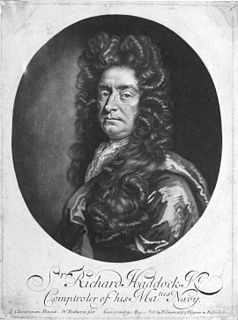Nicholas Haddock (1723 – 19 July 1781) was an English politician who sat in the House of Commons from 1754 to 1761.

The House of Commons of Great Britain was the lower house of the Parliament of Great Britain between 1707 and 1801. In 1707, as a result of the Acts of Union of that year, it replaced the House of Commons of England and the third estate of the Parliament of Scotland, as one of the most significant changes brought about by the Union of the kingdoms of England and Scotland into the Kingdom of Great Britain.
Haddock was the son of Admiral Nicholas Haddock who was also MP for Rochester and the grandson of Admiral Sir Richard Haddock. He inherited Wrotham Place from his father in 1746. [1]

Nicholas Haddock was an admiral in the Royal Navy and Commander-in-Chief of Britain's naval forces in the Mediterranean between 1738 and 1742. Despite an active and successful early and middle career, his reputation was tarnished in 1740 when he failed to prevent the Spanish and French fleets from combining to support an invasion of Italy. Amid public outcry he was forced to resign his naval responsibilities and return to England, where he fell into a melancholic state.

Sir Richard Haddock was an officer of the Royal Navy. He served during the Anglo-Dutch Wars, eventually rising to the rank of Admiral in August 1690. In Herge's Adventures of Tintin, Richard Haddock was one of the inspirations for Captain Haddock's 17th century ancestor, Sir Francis Haddock.

Wrotham is a village on the Pilgrims' Way in Kent, at the foot of the North Downs. It is 1 mile (1.6 km) north of Borough Green and approximately 5 miles (8 km) east of Sevenoaks. It is between the M20 and M26 motorways.
Haddock was elected Member of Parliament for Rochester in 1754 and held the seat to 1761. [2]
Rochester was a parliamentary constituency in Kent. It returned two members of parliament (MPs) to the House of Commons of England from 1295 to 1707, then to the House of Commons of Great Britain from 1708 to 1800, and finally to the House of Commons of the Parliament of the United Kingdom from 1801 until the 1885 general election, when its representation was reduced to one seat.
Haddock died on 19 July 1781, aged 58.
Haddock married Miss Medhurst of Wrotham, but had no children. [3] Wrotham Place passed to his brother and heir-at-law, Charles Haddock. [1]









